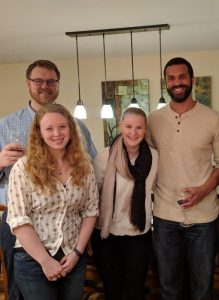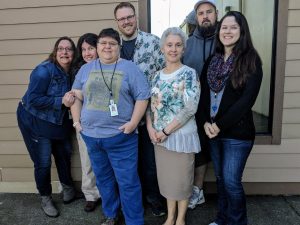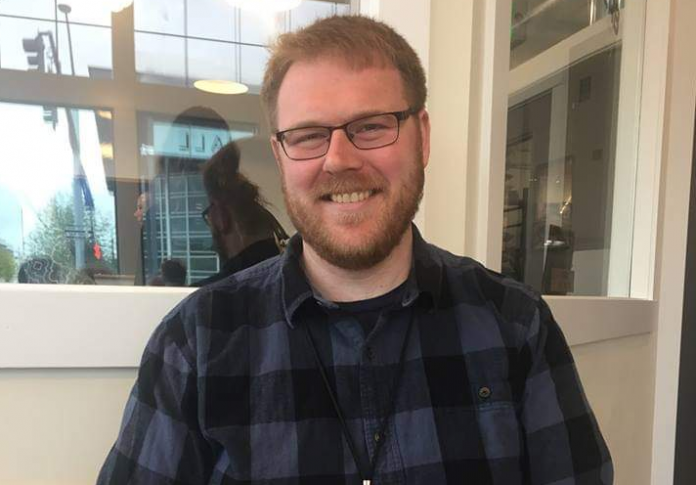Matthew Burrows has spent nearly his entire adult life helping children and their families. He began his career at Camp Korey, a camp for children experiencing serious medical conditions. Burrows started as a staff member ultimately becoming the managing director. Camp Korey empowers children through camp experiences, allowing them to play and be a kid along with others who are experiencing similar medical issues from cerebral palsy to cystic fibrosis and Down syndrome. Over 30 ![]() different medical conditions are supported at Camp Korey, which is named for Korey Rose, a vivacious teen who lost his battle with bone cancer at the age of 18.
different medical conditions are supported at Camp Korey, which is named for Korey Rose, a vivacious teen who lost his battle with bone cancer at the age of 18.
After several years of working in Mount Vernon, Burrows and his wife moved to Olympia. He wanted to continue his work with at-risk youth and families using his experience Camp Korey and felt that a position with the State of Washington would be the next best step. He found his place at the Department of Children, Youth and Families where he works as a Social Service Specialist serving Shelton families. Burrows works on the “back end” of child protective services cases finding solutions for parents and foster families that are in crisis.
A Day in the Life
Burrows has up to 30 kids and their families on his docket on any given day. It is a large case load and the department experiences a lot of turnover due to the intensity of the work. He meets families after they have entered the court system due to intervention from law enforcement and a child has been put in protective custody. He and the agency also field calls from the community.

“Teachers or concerned relatives call our intake line and we have a strict response timeline.” A child assessment must be done within 24-72 hours. Burrows works closely with local police and sheriff departments to make contact. “It can be heartbreaking work, but it is fulfilling to be a part of many amazing stories,” he says. “Even if we cannot reunite a family, you know that you have helped a child.”
Burrows approaches each case hoping to connect families to services that will lead to reuniting parents with their children. “We work with each family to develop a case plan based on where things went wrong,” explains Burrows. “Then we can address those issues, substance abuse, mental health, or domestic abuse and find a way to create a safe environment for the child.”
Finding the appropriate agency or individually contracted counselor is the next step. Behavioral Health Resources is a big part of the plan, helping social service specialists find the type of counseling that each family requires. “When a child is taken from a parent, there is a lot of anger, guilt, and shame,’ says Burrows. “We help the family to move past those emotions to what we can do to get the kids back home.”
Family Recovery Court
Family Recovery Court is an intensive program that requires families to go before a judge each week. Participants in this program have access to an entire team of professionals to help them unify their family. The judge, the Department of Children, Youth and Families, a guardian ad litem, attorneys, and parent advocates all work together to surround the family and provide support.
“When families commit to this program and the team gets involved, families can make strides very quickly,” says Burrows. Coordinating family time is an important part of the job. “Home visits are preferable, either in the family home or a home of a relative, we want the most neutral and least restrictive visitation possible while ensuring the child’s safety.”
Many of Burrow’s clients are homeless and he looks for safe places to do visitation such as local libraries, churches, and other public spaces.

A Success Story
Matthew met a young married couple shortly after their child was removed from their home due to substance abuse. “These parents were very angry and frustrated, but they came to Family Recovery Court and both parents entered 30-day treatment programs. Having lost their home, they secured a grant to get back into a rental and were reunited with their child. Sadly, the mother relapsed and needed another round of treatment, but Matthew was proud to see that the father of the child was able to use his newly acquired parenting skills. “He made the hard choices to keep his child safe and that was a huge success that spoke to what the program can do for parents.”
Using evidence-based practices and research models, parents are taught the importance of consistency, structure, and logical consequences. Tools on how to problem solve with a child who is misbehaving may seem obvious to a sober and well-educated parent, but given to a struggling parent, these tools can be life-changing.
Matthew Burrows wants people to know that the system works and that everyone shares a common goal to keep families together and keep children safe. Anyone can help by reporting any concerns to the DCYF intake line at 1-888-713-6115. “Children can’t call the police so they need responsible adults to keep them safe.”
This article is part of an ongoing series highlighting the work and contributions of public employees. It’s produced with support from WSECU.
















































